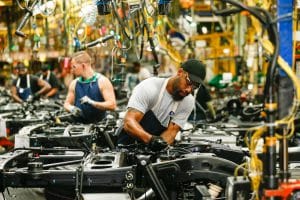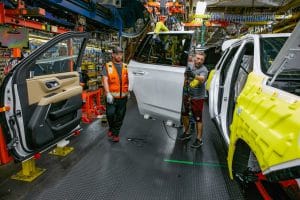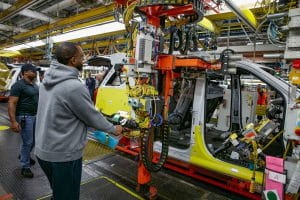
General Motors has scrubbed all overtime at its truck plant in Arlington, Texas due to a shortage of parts caused by the coronavirus pandemic.
The move comes just days after GM had to temporarily idle its Corvette plant in Bowling Green, Kentucky, and it is raising concerns that, with COVID-19 infections soaring to record levels across the U.S., the auto industry could be particularly hard hit.
“We’re going to see other plants hit by this,” said Carla Bailo, the CEO of the Center for Automotive Research in Ann Arbor, Michigan.
(GM shuts down Corvette plant temporarily due to parts issue.)
The auto industry was hammered hard by the pandemic early on, manufacturers forced to close their vast North American production operations for about two months, starting in March. Many dealers across the country also were shut down or forced to do business online, and office closures impacted everything from vehicle design to marketing.
When they began reopening in late May and early June, automakers announced extensive protocols aimed at reducing the risk of infections on the factory floor – including the use of personal protection equipment, social distancing and apps aimed at keeping those already infected from reporting to work.

While there have been some cases reported – prompting temporary work stoppages and disinfection efforts – production has largely moved ahead. If anything, automakers like GM have been pressing to boost the pace, frequently turning to overtime, because they need to make up for two months of lost production.
Even then, “inventory levels will remain lower” than a year ago through at least the end of 2020, GM North America Chief Financial Officer John Stapleton said during a conference call last week.
So, the move at Arlington will be particularly problematic – all the more so because the plant produces new versions of full-sized SUVs including the Chevrolet Tahoe and Suburban, the GMC Yukon and Yukon XL and the Cadillac Escalade and Escalade ESV. These are some of the most popular models in the GM portfolio and have seen average transaction prices surge since their introduction. Any slowdown at Arlington will mean delays for customers and hit the automaker’s fourth-quarter bottom line.
(GM boosting production as virus spreads in key Mexican City.)
For now, the impact is relatively modest, resulting in canceled overtime on Saturday, Nov. 14. “Regular production is not impacted,” GM said in a statement, “and the plant will resume normal operations on Monday, Nov. 16. GM’s supply chain, engineering and manufacturing teams continue to work closely with our suppliers to minimize any parts disruption.”
But the concern is that this may be just a sign of trouble to come. In fact, GM had to temporarily shutter its Corvette plant in Bowling Green for two days this week – the second time that has happened this autumn – due to parts shortages caused by the pandemic.

GM did not offer specific details on why Arlington and Bowling Green are having problems but sources told TheDetroitBureau.com the issue relates to the rapid spread of COVID-19 in Mexico where some of the automaker’s key suppliers are based.
Since manufacturers rely on outside suppliers for a significant share of parts and components, they pose a potentially serious bottleneck. And, as many automotive suppliers are already facing serious economic issues due to the pandemic, insiders warn that not all can maintain the effective protocols needed to keep their plants infection-free.
Two Mexican states, Durango and Chihuahua, have now declared red alert, meaning mandatory restrictions that can impact local factories. States in the rest of the country have set yellow and orange alerts but could also move to stricter mandates if their infection rates rise.
While Mexico has been especially hard-hit by COVID-19, there are new outbreaks spreading worldwide, so industry officials fear that parts supplies could be disrupted on a more frequent basis in the weeks and months to come, at least until a vaccine or some other process helps bring the pandemic under control.
(China’s coronavirus threatens GM truck production.)
Auto sales slumped by more than a third during the early part of the pandemic, but they have been recovering rapidly over the last several months, according to LMC Automotive and other industry research firms. The danger is that new lockdowns could hit the U.S., along with a new round of job cuts that would force consumers to cut back spending. But even if such moves aren’t needed, new inventory problems would mean longer waits for buyers, especially those unwilling to settle for whatever they could find. In turn, slumping sales could short-circuit the industry’s nascent financial recovery.







